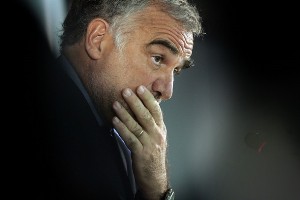ICC judges reject prosecutor’s request for expedited decision on Darfur rebel case
March 2, 2009 (WASHINGTON) — The judges of the Pre-Trial Chamber I at the International Criminal Court (ICC) issued a decision today rejecting the prosecutor’s request to consider on an expedited basis the case he submitted last November against the three unidentified rebel figures.

ICC prosecutor Luis Moreno-Ocampo’s third case on Darfur, opened in late 2007, investigates a rebel attack on the Haskanita military base that left 10 African Union (AU) soldiers dead and one missing.
The counts against the rebel leaders in the case filed under seal included war crimes of violence to life, intentionally directing attacks against personnel, installations, material, units or vehicles involved in a peacekeeping mission and pillaging.
Attacking peacekeepers constitutes a war crime under the Rome Statute which forms the basis of the ICC.
Last December the Pre-Trial Chamber I judges asked the prosecutor for “additional information and supporting materials” on the rebels case by January 26. Ocampo submitted his responses to the judges on January 16th and the 26th.
The redacted version of the judges’ decision today show that Ocampo filed a request with the Chamber on 22nd and 24th December of last year asking for permission to notify the rebel commanders that they have been named as suspects in the application.
The prosecutor justified his request by saying that the notification will enable the rebel commanders to “appear before the Court at an appropriate time”. However the chamber denied the request.
The judges also mentioned that last week the prosecutor asked the judges to issue a quick ruling on the rebels’ case as well as three secret requests.
Today’s decision makes frequent references to a separate case being reviewed by the Chamber against Sudanese president Omer Hassan Al-Bashir. It also mentions the February 3rd closed meeting held between the judges, the registrar, prosecutor and the Victims and Witnesses Unit (VWU).
The meeting was held to discuss aspects in relation to Bashir’s case according to court documents. There was no word on the specific issues tackled but judges revealed that in the session, Ocampo informed the judges of unspecified new events “and undertook to keep the Chamber informed of any developments in this regard”.
Furthermore the judges said that in reaching a decision on Ocampo’s request have considered “all issues raised by the Prosecution’s application for a warrant of arrest for Omar Al Bashir” after which they announced March 4th as decision date on Sudanese president’s case.
It is not clear why Al-Bashir’s case is mentioned in today’s decision though the prosecutor’s request suggests that the prosecutor wanted to begin the process of bringing the rebel commanders at court before March 4th as he believes that it may be more difficult to secure their appearance after that date.
The inference can be made considering the judges’ assertion today that “until the Chamber issues a decision on the Prosecution Application, States have no obligation, pursuant to either the Statute or the United Nations Security Council Resolution 1593, to grant a visa to any such individual for the purpose of travelling to the Hague to appear before this Chamber”.
The ICC prosecutor in his November 20th application left the door open for an issuing a summons to appear rather than an arrest warrant if the rebel commanders cooperate.
“Subject to the Pre-Trial Chamber’s determination, the Prosecution submits that a summons to appear could be an alternative pursued by the Court if the Court receives information as to the possible voluntary appearance of the individuals” the application reads.
Ocampo also told Agence France Presse (AFP) that “while the judges decide on the warrants, they [suspects] now have the chance to appear on their own accord. They know who they are”.
The Pre-Trial chamber brushed aside any prospects of a quick decision on the rebels’ case saying that a “particularly detailed analysis of the materials provided in the Prosecution Application and in the Prosecution’s Provision of Further Information is required”.
They also informed the prosecutor that “in light of the complexity of several aspects of the Prosecution Application” they will in the future refuse to take into account any request for expedited proceedings” or “decide in a manner detrimental to the fundamental rights of the persons for whom warrants of arrest or summonses to appear are requested”.
It is not uncommon for the prosecutor to ask judges for expedited consideration on his applications. Similar requests were made in other cases being handled by the court.
One example is the case against former vice president of Congo Jean Pierre Bemba where the prosecutor said that a quick decision was needed on his application as they have received intelligence that he plans to leave Belgium where he resided which posed risks that he could not be apprehended afterwards.
The judges granted the request enabling the ICC to nab Bemba in Belgium within two weeks of the prosecutor’s application.
Ocampo has in the past expressed confidence that his case against the rebel suspects would gain quick approval from the judges describing it as “straightforward”.
All major Darfur rebel movements have publicly announced that they will cooperate with the ICC even if asked to surrender themselves over in connection with the Haskanita attack.
Sudan refused to recognize the jurisdiction of the ICC saying it has not ratified the treaty establishing the court. Currently there are two ICC arrest warrants pending for Ahmed Haroun, state minister for humanitarian affairs, and militia commander Ali Mohamed Ali Abdel-Rahman, also know as Ali Kushayb.
Khartoum has also said that they will not accept that any Sudanese citizens including rebels to be extradited to The Hague.
(ST)
